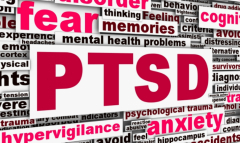 AMAC says Magnetic Resonance Therapy may help Autism & Alzheimer’s patients
AMAC says Magnetic Resonance Therapy may help Autism & Alzheimer’s patients
WASHINGTON, D.C. – Post Traumatic Stress Disorder [PTSD] has been the bane of many veterans who fought in the Iraq and Afghan wars, causing insomnia, panic attacks, alcohol abuse and even suicidal thoughts. Until now, there were few, if any, effective treatment alternatives. But, a new procedure using Magnetic Resonance Therapy developed at the Brain Treatment Center may hold the key to a cure.
Veterans who have successfully undergone the MRT treatment use terms like “miracle,” “game-changer” and “waking up” to describe the results they achieved at the BTC facility in Newport Beach, Calif.
PTSD, according to the Association of Mature American Citizens, is “what we used to call ‘battle fatigue’ or ‘shell shock’ and it manifests itself in variety of debilitating ways. Returning soldiers are awakened in the midst of war-based nightmares. They experience panic attacks and some harbor thoughts of taking their own lives. One report showed an 80 percent increase in suicides among soldiers returning from the war fronts in the Middle East during the height of the wars in Iraq and Afghanistan.”
AMAC is keeping a watchful eye on the MRT treatment alternative because of its potentially effective use in the treatment of Alzheimer’s disease. “But, the fact that it is helping our wounded warriors to cope with the aftermath of war is an important first focus.”
Many of the PTSD treatments to date have focused on the symptoms of the disorder; the MRT procedure appears to concentrate on the workings of the brain, itself. As Dr. Kevin T. Murphy, Vice Chair of the Department of Radiation Medicine and Applied Sciences, UC San Diego Medical Center, put it: “Addressing the core frequency mismatch that occurs in various parts of the brain, and not the patient’s symptoms per se, allows this system to be potentially useful in numerous psychological and neurological disorders, from autism to Alzheimers.”
Dr. Yi Jin, medical director of the Brain Treatment Center, is careful in an encouraging way when he describes the successes of the BTC’s new therapeutic approach. “We are not claiming efficacy, but we are seeing clinical responses that are positive.”
Both Murphy and Jin are believers and intent on proving the efficacy of their approach. As Murphy, whose 10-year-old son is afflicted with Asperger’s syndrome, told Richard Leiby, a senior writer at the Washington Post: “Right now it’s like we’re selling snake oil. It’s hard to believe, and if I hadn’t had my own son treated, I wouldn’t have believed it.”
The child underwent months of therapy and has shown extraordinary improvement as a result.
Likewise, Iraqi war veteran Jon Warren says he recovered from acute PTSD after he was treated with Magnetic Resonance Therapy. He no longer suffers from the extreme combat flashbacks and nightmares that made him dysfunctional. They set “my [brain] frequencies right” and his life is returning to normal.



